| Author |
Rousseau, Jean-Jacques, 1712-1778 |
| Translator |
Schöpflin, Aladár, 1872-1950 |
| Title |
Emil, vagy a nevelésről
|
| Note |
Reading ease score: 57.2 (10th to 12th grade). Somewhat difficult to read.
|
| Note |
Wikipedia page about this book: https://en.wikipedia.org/wiki/Emile,_or_On_Education Wikipedia page about this book: https://hu.wikipedia.org/wiki/Emil,_avagy_a_nevel%C3%A9sr%C5%91l
|
| Credits |
Albert László from page images generously made available by the HathiTrust Digital Library
|
| Summary |
"Emil, vagy a nevelésről" by Jean-Jacques Rousseau is a philosophical treatise on education written in the late 18th century. The book outlines Rousseau's views on how to educate a child, presenting a holistic approach to nurturing their natural abilities and individuality. Central to this exploration is the character Emil, whose development serves as a framework for discussing the implications of upbringing and the role of society versus nature in shaping a person. At the start of the work, Rousseau engages in a reflective preface, explaining his intent to write about education as a vital topic that has been overlooked in favor of traditional methods. He critiques existing societal institutions and norms, suggesting that they often undermine the natural development of the child. Rousseau illustrates the importance of allowing children freedom to grow, akin to nurturing a plant in its natural environment, and emphasizes the foundational nature of education in fulfilling human potential. Through his philosophical musings, he sets the stage for Emil's journey of enlightenment, hinting at the expected struggles against societal constraints as he matures. (This is an automatically generated summary.)
|
| Language |
Hungarian |
| LoC Class |
LB: Education: Theory and practice of education
|
| Subject |
Education -- Early works to 1800
|
| Category |
Text |
| EBook-No. |
66903 |
| Release Date |
Dec 8, 2021 |
| Copyright Status |
Public domain in the USA. |
| Downloads |
964 downloads in the last 30 days. |
|
Project Gutenberg eBooks are always free!
|

